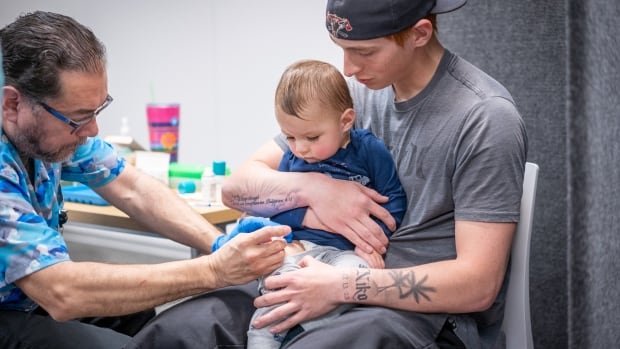Health
Canada Faces Measles Surge: Vaccination Questions Addressed

Measles cases are rising alarmingly in Canada, particularly in 2025, with over 2,200 reported cases in Ontario alone. The situation has led to hundreds being hospitalized and one reported measles-related death. While the outbreak in Ontario appears to be declining, Alberta is now experiencing a surge with nearly 1,300 confirmed cases so far. With every province except Newfoundland and Labrador reporting instances of the virus, the Public Health Agency of Canada (PHAC) has addressed common questions regarding vaccination and immunity.
Understanding Immunity After Measles
For individuals who had measles during childhood, the PHAC states that they are most likely immune to future infections, provided they have a normal immune response. Past infections typically confer immunity, protecting against reinfection.
Those who have lost their vaccination records may wonder if they need to receive another dose. Generally, the PHAC recommends that both children and adults without vaccination documentation begin an immunization schedule that is appropriate for their age and risk factors. Additionally, it is considered safe for health-care providers to administer another dose of the vaccine, even if the individual has been vaccinated previously. The agency has not observed significant side effects from repeated immunization.
According to Dawn Bowdish, a professor of immunology at McMaster University, a national vaccine registry would significantly streamline the process for those trying to trace their vaccination history. She noted, “The number of people looking to figure out if they got one dose, if they got two doses, or if they were vaccinated as children and perhaps moved provinces without their records is extremely high.”
Testing and Vaccination Protocols
Individuals may wonder if they can check their immunity status against measles. The PHAC advises that routine testing for laboratory evidence of measles immunity is not recommended for the general population. However, specific groups, such as health-care workers and some pregnant women, may receive blood tests to check for measles antibodies. Those who have received two doses of a measles-containing vaccine or were born before 1970 are generally presumed to be immune.
When it comes to entering Canada, proof of measles vaccination is not required. A spokesperson for Immigration, Refugees and Citizenship Canada stated that while permanent and certain temporary residents must undergo an immigration medical examination prior to arriving in Canada, this exam includes screenings for some communicable diseases. During this process, vaccinations, including the measles, mumps, and rubella shots, may be offered.
Health professionals working with recent immigrants and asylum seekers report that their patients are generally receptive to receiving any childhood vaccinations they may have missed. Nonetheless, they emphasize that the federal government could enhance pre-departure vaccination initiatives and facilitate access to medical and vaccination records across borders.
As Canada grapples with the resurgence of measles, addressing vaccination concerns and improving public health infrastructure will be crucial in mitigating the spread of the virus and protecting vulnerable populations.
-

 Politics4 weeks ago
Politics4 weeks agoSecwepemc First Nation Seeks Aboriginal Title Over Kamloops Area
-

 World5 months ago
World5 months agoScientists Unearth Ancient Antarctic Ice to Unlock Climate Secrets
-

 Entertainment5 months ago
Entertainment5 months agoTrump and McCormick to Announce $70 Billion Energy Investments
-

 Science5 months ago
Science5 months agoFour Astronauts Return to Earth After International Space Station Mission
-

 Lifestyle5 months ago
Lifestyle5 months agoTransLink Launches Food Truck Program to Boost Revenue in Vancouver
-

 Technology3 months ago
Technology3 months agoApple Notes Enhances Functionality with Markdown Support in macOS 26
-

 Lifestyle3 months ago
Lifestyle3 months agoManitoba’s Burger Champion Shines Again Amid Dining Innovations
-

 Top Stories2 months ago
Top Stories2 months agoUrgent Update: Fatal Crash on Highway 99 Claims Life of Pitt Meadows Man
-

 Politics4 months ago
Politics4 months agoUkrainian Tennis Star Elina Svitolina Faces Death Threats Online
-

 Sports5 months ago
Sports5 months agoSearch Underway for Missing Hunter Amid Hokkaido Bear Emergency
-

 Politics5 months ago
Politics5 months agoCarney Engages First Nations Leaders at Development Law Summit
-

 Technology5 months ago
Technology5 months agoFrosthaven Launches Early Access on July 31, 2025





















